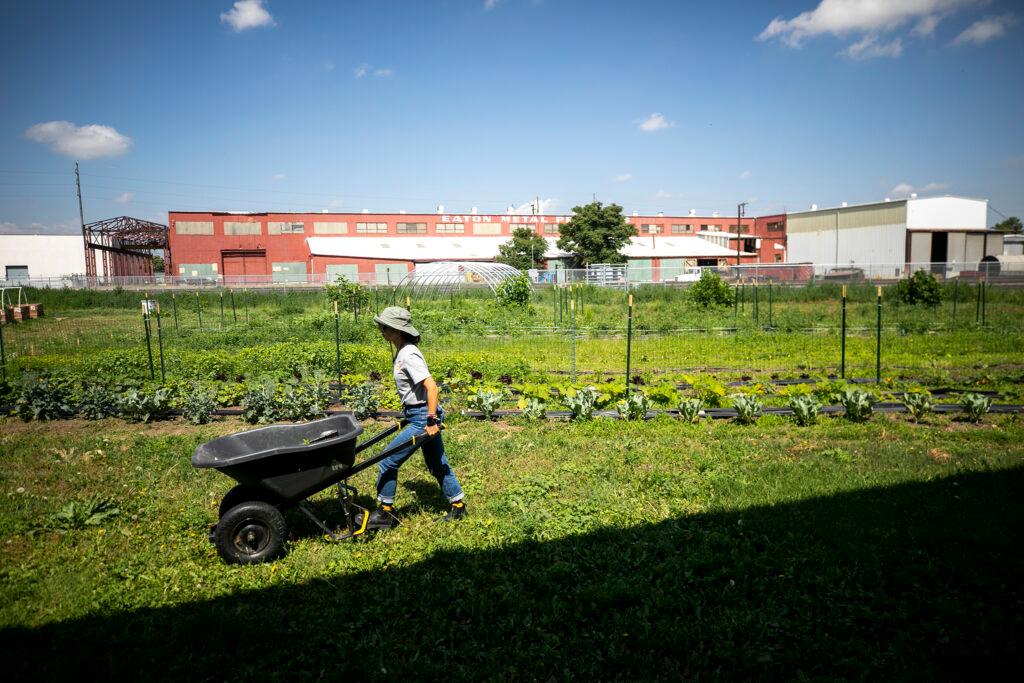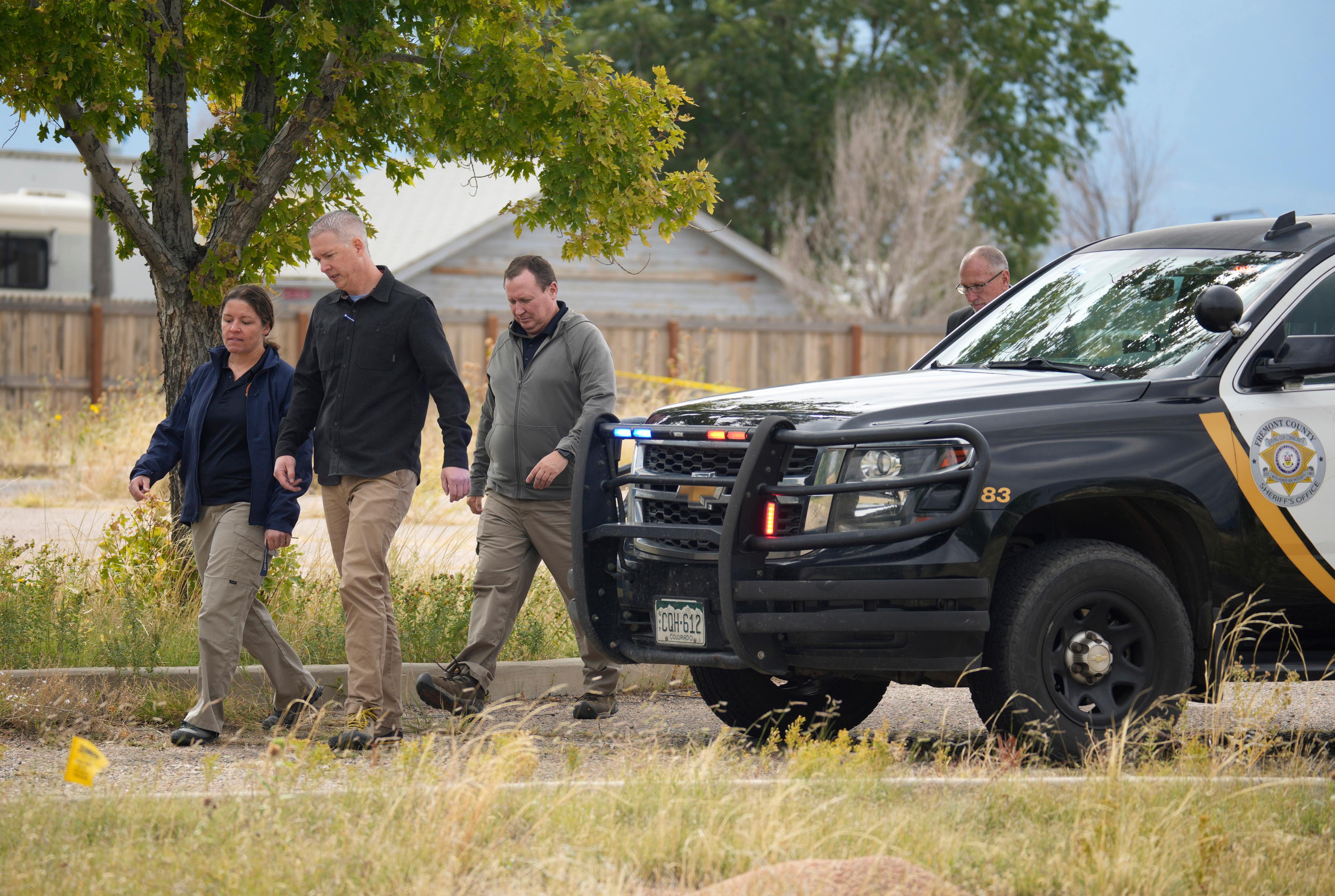
A climate resilience center in southwest Denver. A tree-planting project along Interstate 70. A constellation of urban gardens.
Those are just some of the Colorado projects on life support after the U.S. Environmental Protection Agency terminated federal grants to support environmental justice programs.
Since President Trump returned to office, his administration has targeted federal support for initiatives seeking to address the disproportionate impact of toxic pollution and climate change in less-white and less-affluent communities. Multiple studies have linked concentrated environmental impacts to poor health outcomes.
The approach marks a swift reversal from the Biden administration, which made rectifying environmental inequality a core piece of its climate strategy. The 2022 Inflation Reduction Act, for example, earmarked nearly $3 billion to support environmental justice projects and established an environmental justice office within the EPA to distribute the funding.
Those federal grants began arriving in Colorado in late 2024. KC Becker, who oversaw the Mountain West region as the former EPA Region 8 administrator, said her team recognized political support for environmental justice would likely evaporate under a future Trump administration.
“We knew the grants were at risk, and we worked to finalize as much as we could,” Becker said.
Turns out Becker was right to worry. EPA Administrator Lee Zeldin has called environmental justice “an excuse to fund left-wing activists” rather than fix actual environmental issues. Besides putting all employees within its environmental justice office on leave, the EPA is now seeking to cancel 781 grants meant to bolster clean energy and environmental projects, according to an April court filing. Almost all of the impacted grant programs focus on environmental justice.
It’s unclear how many of those grants would fund projects in Colorado or the Mountain West. A separate list released by several Democratic senators in March identified 13 Colorado-based environmental justice grants targeted for termination, which would have sent nearly $25 million to communities, nonprofits and tribal nations.
Cyrus Western, the new EPA Region 8 administrator, said in a written statement that the agency has vetted grants to determine if they’re an appropriate use of taxpayer dollars and align with Trump administration priorities. “Grants that do not support the Administration’s agenda have been terminated,” Western said.
Here are some examples of community and nonprofit projects grappling with uncertainty due to grant terminations or federal funding freezes. A spokesperson with EPA Region 8 confirmed it has terminated funding for each project listed below.
A new climate resilience center in southwest Denver
Organization: Commún
Total grant: $20,000,000
A week before President Trump’s second inauguration, Commún, a Denver-based nonprofit, received a $20,000,000 EPA grant to establish a resilience and community center in southwest Denver.
The center would usually serve as a gathering space in the heart of the Loretto Heights campus, a former Catholic boarding school and college. Developers are now reshaping the site into a neighborhood and culture hub. The project would transform Machebeuf Hall, a former cafeteria and student union built in the 1950s, into a multipurpose facility with a grocery store, food stalls, a mental health center and a laundry facility.

It was also meant to serve as a disaster refuge in moments of crisis. In the event of a grid failure, for example, backup batteries and solar panels would help keep the center’s lights on. Air filtration would also help protect occupants from wildfire smoke or other air pollution threats.
Margaret Brugger, the executive director of Commún, said the grant would have allowed her group to start construction in March. It put those plans on hold after the EPA froze the grant shortly after President Trump’s inauguration, and the group received a termination letter ending the grant funding in mid-May. The nonprofit is now working to appeal the decision and exploring ways to move forward with pieces of the estimated $30 million project.
“Obviously, it’s disappointing, but I will always keep hope,” Brugger said.
Trees and shrubs along Interstate 70 in Globeville
Organization: National Wildlife Federation and the Green Dot Coalition
Total grant: $500,000
In 2023, the National Wildlife Federation won a $500,000 EPA environmental justice grant to plant trees and vegetation along Interstate 70 in Denver’s Globeville neighborhood, an area with well-documented air pollution issues compounded by traffic and major factories.

The nonprofit applied for the grant in partnership with Green Dot Coalition, a far smaller organization working to establish green spaces in historically disadvantaged urban communities. The project aims to improve barren concrete planters lining 10 blocks on either side of the highway.
On a recent visit, Jevon Taylor, the executive director of Green Dot Coalition, said almost all vegetation died more than a decade ago due to neglect and a faulty irrigation system. The only exception is a single tree clinging to the edge of one planter, which he said local residents don’t want cut down.
“It represents the neighborhood. It represents Globeville and Elyria and how resilient they are,” Taylor said.
The National Wildlife Federation said the EPA terminated its grant at the end of March. Before then, Taylor said his group managed to spend $175,000 to pay an irrigation contractor and secure supplies. As a result, it will proceed with plans to paint a mural and plant containers on one side of the highway this summer. He’s not sure if or when the group can proceed with plans to improve the north side of the highway.
Fruit trees and vegetable gardens in west Denver
Organization: Denver Urban Gardens
Total grant: $500,000
Denver Urban Gardens received a $500,000 EPA grant in November 2023. It also received an additional $350,000 through a United States Department of Agriculture project to support urban agriculture projects and innovation around the same time.

Linda Appel Lipsius, the nonprofit’s executive director, said the funding would have helped her group install six new community gardens and nine “food forests” in west Denver. She said those projects would have supported issues identified by a recent city planning initiative, which found the area lacks grocery stores and green infrastructure to guard against rising urban temperatures.
Lipsisus said since President Trump took office, the federal government has terminated access to both awards. Denver Urban Gardens is now only moving forward with two gardens and up to four or five food forests.
“It’s just heartbreaking,” Appel Lipsius said. “It just seems like this is such simple, straightforward, foundational, apolitical work, and that this is getting caught up in all this just feels confusing and misguided."
A major hub for future grants
Organization: Mountains and Plains Environmental Justice Grants Hub
Total grant: $48 million
Beside cutting off access to previously awarded grants, the EPA has also ended funding for another program designed to help rural governments and small organizations access federal resources.
In February, the Trump administration terminated $177 million in federal funding for technical assistance centers to help rural communities and tribal nations apply for federal funding. The cut ended a $10 million center at Montana State University to assist rural communities and tribal nations in the Mountain West.
Then, in early May, the EPA also terminated its companion initiative: the Thriving Communities Grantmaking Program, a $600 million initiative to hand out small grants worth up to $350,000 through 11 regional hubs around the country. The Mountain and Plains Environmental Justice Grants Hub, or MAP EJ Grants Hub, planned to distribute $40 million funding throughout EPA Region 8.
The Biden administration selected JSI Research and Training Institute, a Denver-based public health and education nonprofit, to operate the MAP EJ Grants Hub.
Alexandra Witonsky joined as a grant manager for the new program in August 2024. In an interview with CPR News, she said the initiative had committed about $20 million to fund 96 projects before the Trump administration terminated its funding in early May. She also lost her position with JSI following the funding cuts.
Michelle Gabrieloff-Parish leads FLOWS, a Boulder-based climate justice group that earned $250,000 from the MAP EJ Grants Hub, but the funding wasn’t finalized before the Trump administration terminated the program.
Gabrieloff-Parish said the grant would have supported projects to replace turf with native plants at affordable housing projects and help a mobile home community fight for clean drinking water. If the Biden administration was serious about environmental justice, she said it should have distributed the funding faster.
“These funds were always meant to support frontline communities. We were just last in line, we got them last, and they got cut,” Gabrieloff-Parish said.
Editor’s note: Linda Appel Lipsius is a member of the Colorado Public Radio Board of Directors. She had no editorial influence on this story.









